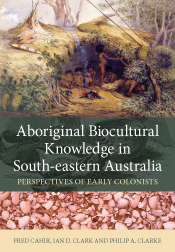Aboriginal Biocultural Knowledge in South-eastern Australia
Perspectives of Early Colonists
By: Fred Cahir, Ian D Clark, Philip A ClarkeProvides an insight into the environmental knowledge of Indigenous Australians.
Indigenous Australians have long understood sustainable hunting and harvesting, seasonal changes in flora and fauna, predator–prey relationships and imbalances, and seasonal fire management. Yet the extent of their knowledge and expertise has been largely unknown and underappreciated by non-Aboriginal colonists, especially in the south-east of Australia where Aboriginal culture was severely fractured. + Full description
Aboriginal Biocultural Knowledge in South-eastern Australia is the first book to examine historical records from early colonists who interacted with south-eastern Australian Aboriginal communities and documented their understanding of the environment, natural resources such as water and plant and animal foods, medicine and other aspects of their material world. This book provides a compelling case for the importance of understanding Indigenous knowledge, to inform discussions around climate change, biodiversity, resource management, health and education. It will be a valuable reference for natural resource management agencies, academics in Indigenous studies and anyone interested in Aboriginal culture and knowledge.
Cultural sensitivity
Readers are warned that there may be words, descriptions and terms used or referenced in this book that are culturally sensitive, and which might not normally be used in certain public or community contexts. While this information may not reflect current understanding, it is provided by the author in a historical context.
Reviews
"The authors should be commended for producing an interesting book that provides a rich picture of Indigenous life in an important region of Australia."
Tim Low, Wildlife Australia, Spring 2018
"The authors of Aboriginal Biocultural Knowledge in South-eastern Australia should be congratulated for producing a richly detailed reference work that brings together in one place information on important topics from a very diverse range of sources."
Hilary Howes, Historical Records of Australian Science 30(1) 2019
"This book does contribute valuable information that will be useful to the national conversation about recognising Indigenous knowledge
systems and how we might better inform sustainable management of Australia’s biodiversity, land, natural resources, health, education and more."
Inoka Amarasekara, Focus Magazine, September 2018
Details
Paperback | May 2018 | $ 69.95ISBN: 9781486306114 | 360 pages | 245 x 170 mm
Publisher: CSIRO Publishing
Illustrations, Photographs
ePDF | May 2018
ISBN: 9781486306121
Publisher: CSIRO Publishing
Available from eRetailers
ePUB | May 2018
ISBN: 9781486306138
Publisher: CSIRO Publishing
Available from eRetailers
Features
- First book to examine historical records from early colonists who interacted with south-eastern Australian Aboriginal communities.
- Provides understanding of Indigenous knowledge, to inform discussions around climate change, biodiversity, resource management, health and education.
- Illustrated with photographs and historical images.
Contents
Foreword (PDF, 56kb)Acknowledgements
Introduction
1. Totemic life
2. Terrestrial spirit beings
3. Water spirit beings
4. Plant food
5. Animal food
6. Water
7. Fire in Aboriginal south-eastern Australia
8. Watercraft
9. Shelter: housing
10. Clothing
11. Wellbeing
12. Healing
13. Trade
14. Space
15. Time
Conclusion
References
Index
View the full table of contents (PDF, 537kb).
Authors
Fred (David) Cahir is an Associate Professor in Aboriginal Studies at Federation University Australia in the Faculty of Education and Arts. His Masters and PhD focused on local Victorian Aboriginal history. His research interests include Victorian Aboriginal history, Australian frontier history, Aboriginal heritage tourism history, Aboriginal biocultural knowledge and toponyms (place names).
Ian D. Clark is a Professor of Tourism in the Business School at Federation University Australia. He has a PhD in Aboriginal Historical Geography from Monash University. He has been researching Aboriginal history since 1982. He has been the manager of the Brambuk Aboriginal Cultural Centre in Halls Gap, and the History Research Fellow at AIATSIS in Canberra. His areas of interest include Aboriginal history, the history of tourism, and place names.
Philip A. Clarke is a consultant anthropologist, working in native title and Aboriginal heritage. With an academic background in both science and anthropology, his research interests are focused on the ethnosciences, in particular Australian ethnobiology and ethnoastronomy.








